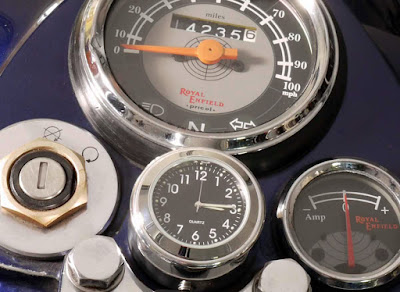 |
| Stem nut clock for Royal Enfields from Hitchcocks Motorcycles. |
Riding an old Royal Enfield Bullet is and ought to be a minimalist experience. One cylinder. One spark plug. Vibrations in your butt instead of a tachometer. You get the idea.
But I could use a clock.
Sometimes you want to be on time to an appointment and simply want to know how many minutes you have left to get there. While riding you don't want to have to pull up your sleeve to see a wrist watch.
And you definitely don't want to mount a modern phone on your vintage motorcycle!
The obvious solution would be to buy one of the cute little clocks sold for Royal Enfields. They are surprisingly attractive. Clever, too. They attach with a small set screw to the steering stem nut. Another design attaches to the handlebars themselves.
But are they really retro enough for Royal Enfield?
I wondered: is there some more vintage way to equip my Bullet with a timepiece?
Richard Miller blogs about vintage motorcycles and bicycles at RedDevilMotors. In reply to my question he said he hadn't noticed clocks in the old photographs he often reproduces on the blog. But he suspects clocks were around.
"In earlier days (from the late nineteenth century up to the mid-twenties) an available accessory for both motorcycles and bicycles was the handlebar pocket watch holder," he wrote in an email.
Smiths offered accessory clocks for motorcycles and cars, and clocks appeared in the tank-mounted instrument panels that became popular in the 1930s, he added.
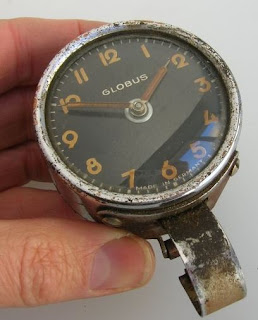 |
| This looks awfully big to ride on the handlebars. |
And for only $1,590! Plus shipping, of course.
The "Globus" clock was being offered by the Alexwoa online "museum." Photos with the ad showed it to be fairly large, meant to be mounted on a handlebar, and set and wound from the back. Details otherwise were few, the museum only adding "Working!" and "Wow!"
The numbers and hands on the clock looked as though they might be luminous. Radioactive, I wondered? Otherwise there was no provision for lighting.
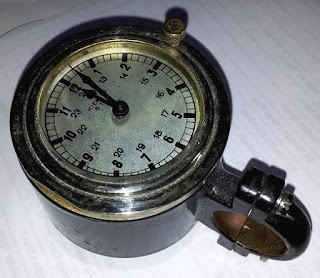 |
| The Kienzle clock reads in 12-hour and 24-hour modes. |
Further searching on the Internet found another antique German handlebar clock, the "8 tag" (meaning 8-day) Kienzle clock. It appeared very well made, with a substantial mounting, and meant to cleverly swing out of its casing to allow it to be wound and set. It didn't look as though it was meant to glow in the dark, however.
 |
| The Kienzle swings out of its case to be set and wound. |
To be honest, these seem too big and clunky for my handlebars. Even back then they would have been inconvenient, expensive and therefore rare.
Still, riders of the past surely found ways to neatly wrap a wrist watch around their handlebars.
I found one technique for doing this recommended on RoadbikeReview, a bicycling site. The author meant the watch case to end up above the handlebar, but I couldn't make that work. The vibration of the Bullet motor and weight of the watch case would have allowed the watch to rotate around the bar.
It might work, I thought, with the watch hanging under the handlebars, pendulum like. Then the weight of the watch case would keep it in place.
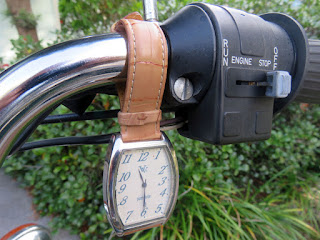 |
| Dangling watch would be OK here, except... |
Here's how I would do it:
1. Hold both ends of the bands together, above the clock face, with the plain band running behind the watch case.
2. Slide the plain band all the way through the little loop on the buckle band designed to retain the excess when the band is buckled. This will leave both bands pinched together.
3. Wrap the loose end of the bands around the bar (the "pinched" area will be below the bar).
4. Tightly buckle the strap as usual.
"This always worked easy for me and didn't result in a 'bulky' foam knot on my bar. It's sleek and simple," the author wrote.
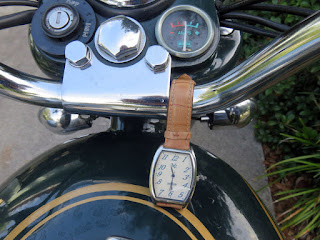 |
| ...if watch slides down bars like this it would scratch tank. |
A leather strap has a vintage appeal. But while it might work on a bicycle, it's a nonstarter for my Royal Enfield Bullet, as the case of the watch would impact the tank when the strap inevitably slipped to a lower point on the handlebars.
Any suggestions readers?
 |
| Here's an idea: clock replaces amp meter on custom Bullet. |


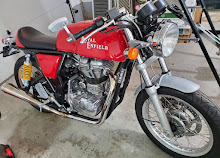


















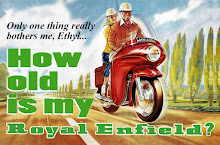




It has to be a stem nut clock, I've had the same one on various bikes over the last 15yrs. It doesn't look out of place, in fact on the Enfield I think it looks as though it's part of the cluster as the first photo shows. Years ago when you could get a LCD cheapo watch for a couple of quid I did what you show and dangle it from the bars, worked fine but they kept getting pinched. So for me a stem nut watch.
ReplyDeleteA stem nut clock is fine, but for a "vintage" Royal Enfield is MUST NOT BE a quartz abomination. It must have a mechanical wind-up movement.
ReplyDeleteNice article! Personally, I've kind of gone out of my way NOT to have a clock mounted on the Bullet. That's kinda my time away from time. If the wife needs me for something she can call...I might even call back. Instead, I've got a garish old steampunk Chinese windup pocket watch in the breast pocket of the Belstaff attached to a fob chain clipped to the pocket edge more for glitz than anything else. It cost me the princely sum of about $4 delivered several years ago, and keeps remarkably decent time, as shown here: https://forum.classicmotorworks.com/index.php?topic=29658.msg353037#msg353037. It's just requires a bit more of a deliberate seeking of the time, you know? That said, I'm not a complete Luddite. I also adore my two Timex Expedition Time-Tide-Temp-Compass watches described elsewhere in that thread, and won't sail without one. You can keep your Rolex Yachtsman. For about $100, those Timexes are affordable elegance and just do WAY more.
ReplyDelete